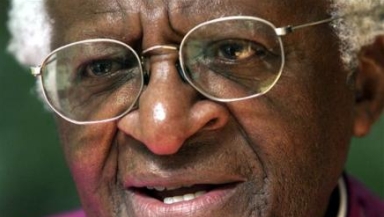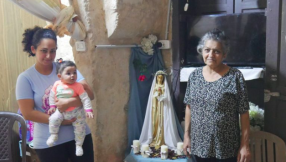
Last week former Archbishop of Canterbury George Carey came out in favour of assisted dying; this weekend, he was joined by another Anglican leader - Archbishop Desmond Tutu.
In an article for the Observer published on Saturday, Tutu insists: "I revere the sanctity of life – but not at any cost.
"Dying is part of life. We have to die. The Earth cannot sustain us and the millions of people that came before us. We have to make way for those who are yet to be born. And since dying is part of life, talking about it shouldn't be taboo," he writes.
"People should die a decent death. For me that means having had the conversations with those I have crossed in life and being at peace. It means being able to say goodbye to loved ones – if possible, at home."
He said the way in which Nelson Mandela was widely televised in his last days, despite being incredibly unwell, was "an affront to Madiba's dignity". Tutu suggests instead that society should open up conversation about "what does it mean to be alive" and consider the best possible use of our resources.
"But why is a life that is ending being prolonged? Why is money being spent in this way?" he asks.
"It could be better spent on a mother giving birth to a baby, or an organ transplant needed by a young person. Money should be spent on those that are at the beginning or in full flow of their life.
"I revere the sanctity of life – but not at any cost. I confirm I don't want my life prolonged. I can see I would probably incline towards the quality of life argument, whereas others will be more comfortable with palliative care. Yes, I think a lot of people would be upset if I said I wanted assisted dying. I would say I wouldn't mind actually."
Tutu finishes his column by declaring the need for "a mind shift in our societies" regarding death.
"We need to think. We need to question. What is life? And isn't death part of living – a natural part of life?" he concludes.
Tutu adds that "these are my personal opinions and not of my church", and indeed other Christian leaders have been deeply critical of arguments in favour of assisted dying, fearing that a change in law could result in the abuse of vulnerable patients.
Archbishop of Canterbury Justin Welby wrote in the Times on Saturday: "What sort of society would we be creating if we were to allow this sword of Damocles to hang over the head of every vulnerable, terminally ill person in the country?"
He argues that Lord Falconer's Assisted Dying Bill, which will receive its second reading in the House of Lord's this Friday, is "naive" for assuming that protections will stop vulnerable people, worried about burdening their families, from being pressured into ending their lives.
"Abuse, coercion and intimidation can be slow instruments in the hands of the unscrupulous, creating pressure on vulnerable people who are encouraged to 'do the decent thing'," Welby warns.
Ahead of the Bill's first reading, the Spectator published an article by James Mumford, son of John and Ele of the Vineyard movement and a fellow at the University of Virginia's Institute for the Advanced Studies in Culture, last November.
Like Welby, Mumford warned that the introduction of Lord Falconer's Bill would put the most vulnerable at risk. "Older people so feel like they are becoming a burden – to the state, to society, to their families. They may never say so, but our endless talk of the ageing society as a 'demographic time-bomb' has rubbed off.
"And it is in this context that we are contemplating introducing euthanasia? Because the whole point about the 'coercion' Falconer is adamant to avoid is that the more powerful it is, the less explicit it will be. How do we know if a terminally ill person feels pressured to hasten their death? They will certainly not admit it."
Mumford concluded that if the Bill is passed now, it could signify the beginning of a slippery slope towards more dangerous laws regarding assisted dying in the future.
"Euthanasia advocates complain about the way their opponents bleat on about 'the thin end of the wedge'. But the reason we do so is because, as with the whole abortion issue, we have seen wedges getting thicker," he writes.
"What started out as an urgent measure to help distressed women in desperate circumstances has become 190,000 abortions a year and rising.
"Incremental steps, minor adjustments, tiny turns – that is how great and terrible change occurs."













